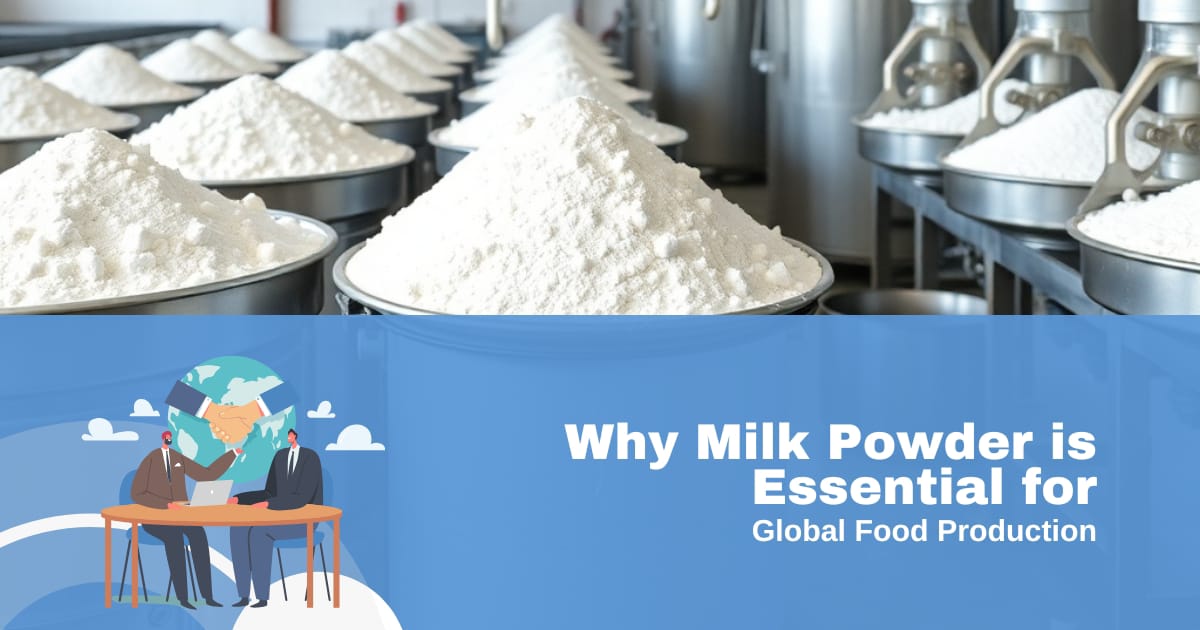Milk powder has become a cornerstone of global food production, revolutionizing the way dairy is used, stored, and transported. Its versatility, long shelf life, and cost-effectiveness make it an indispensable ingredient in a wide range of food applications. This blog explores the key reasons why milk powder is vital for the global food industry and how it addresses challenges in food security and production.
The Advantages of Milk Powder
- Long Shelf Life
Milk powder stands out for its remarkable shelf life compared to fresh milk. It can be stored for months or even years without refrigeration, making it a reliable option for regions with limited access to cold storage facilities. This longevity significantly reduces food waste and ensures dairy availability even in the most remote areas.
- Ease of Storage and Transport
Thanks to its lightweight and compact form, milk powder is easy to store and transport. Its reduced bulk makes it cost-effective for shipping over long distances, supporting international trade and ensuring consistent supply in global markets.
- Nutritional Benefits
Milk powder retains nearly all the essential nutrients of fresh milk, including high-quality protein, calcium, and vitamins. These nutrients make it an excellent choice for enriching food products, contributing to healthier diets worldwide.
- Cost-Effectiveness
Producing milk powder in bulk reduces costs for manufacturers and distributors. It offers a scalable solution for large-scale food production while providing an affordable dairy alternative for consumers.
Applications in Global Food Production
Milk powder is an essential ingredient in numerous food categories, contributing to their quality, flavour, and nutritional value.
1. Bakery and Confectionery
Milk powder enhances the texture, flavour, and shelf stability of baked goods and sweets, making it a favourite among bakers and confectioners.
2. Beverages
From instant coffee and tea mixes to milk-based drinks, milk powder is a key ingredient that adds creaminess and consistency.
3. Processed Foods
Used in soups, sauces, and ready-to-eat meals, milk powder enhances the creaminess and richness of various processed foods.
4. Ice Cream and Dairy Products
In the dairy industry, milk powder serves as a base ingredient for making ice cream, yoghurt, cheese, and other products.
Role in Ensuring Food Security
Milk powder plays a vital role in addressing global food security challenges by ensuring a steady and reliable dairy supply.
- Addressing Supply Chain Challenges
In times of fresh milk shortages or supply chain disruptions, milk powder serves as a dependable alternative, maintaining production continuity.
- Supporting Global Markets
Countries with limited dairy production rely on imported milk powder to meet their needs, supporting food production in diverse regions.
- Emergency and Humanitarian Use
Milk powder is a lifesaver in disaster relief and humanitarian efforts, providing a quick and nutritious food source for affected populations.
Innovations and Sustainability in Milk Powder Production
As demand for milk powder grows, the industry is embracing innovative and sustainable practices to meet global needs.
1. Advances in Processing Techniques
Modern processing technologies ensure higher quality, improved safety, and better efficiency in milk powder production.
2. Sustainable Practices
Efforts to reduce the environmental impact include optimizing energy use, adopting eco-friendly packaging, and sourcing milk from sustainable dairy farms.
Conclusion
Milk powder is more than just a convenient dairy product; it is an essential element of modern food production and global food security. Its versatility, durability, and nutritional value make it a critical ingredient for meeting the world’s growing food demands sustainably. Whether used in bakeries, beverages, or emergency relief, milk powder continues to revolutionize the way we produce and consume food.
FAQs
1. What is milk powder made of?
- Milk powder is made by evaporating water from fresh milk, leaving behind a dry, concentrated product that retains the nutrients of milk.
2. How long can milk powder be stored?
- When stored in a cool, dry place, milk powder can last 12 to 24 months, depending on the type and packaging.
3. Is milk powder as nutritious as fresh milk?
- Yes, milk powder retains most of the nutrients found in fresh milk, including proteins, calcium, and vitamins, making it a healthy alternative.
4. What are the types of milk powder available?
- Common types include full cream milk powder, skimmed milk powder, and speciality powders like infant formula or fortified powders.
5. How is milk powder used in cooking?
- Milk powder is versatile in cooking, and used in recipes for bread, cakes, soups, sauces, and beverages to add flavour, creaminess, and nutritional value.

